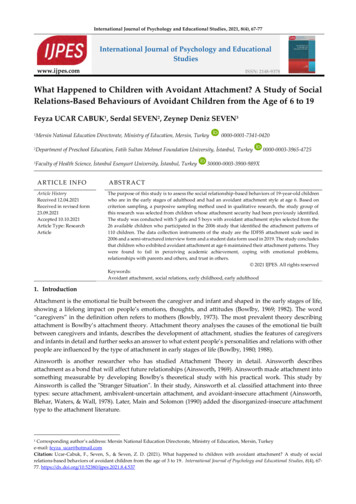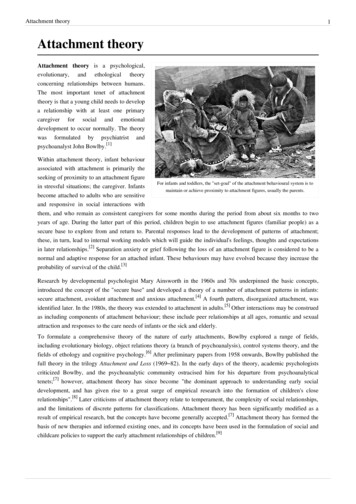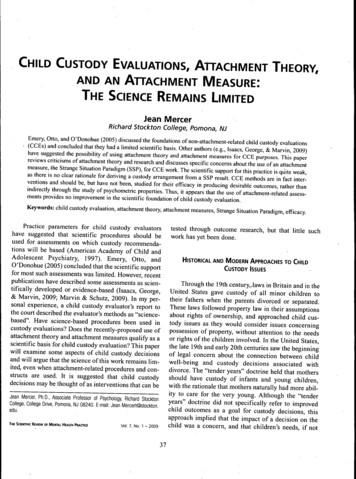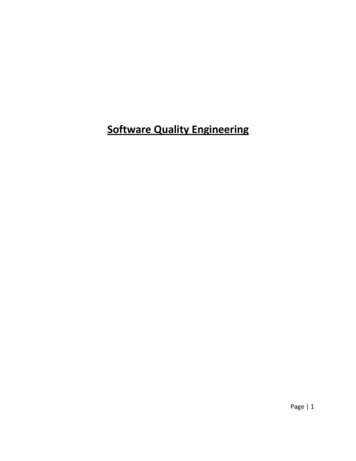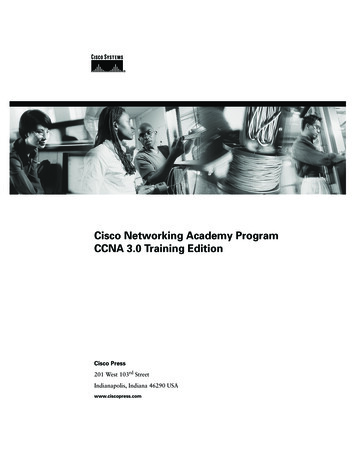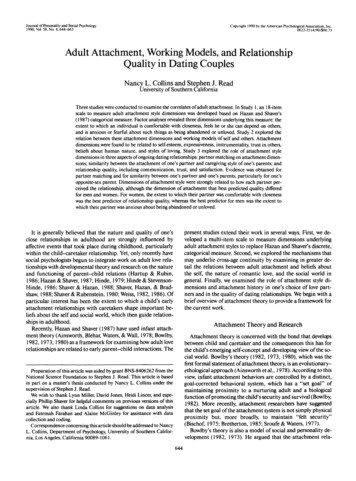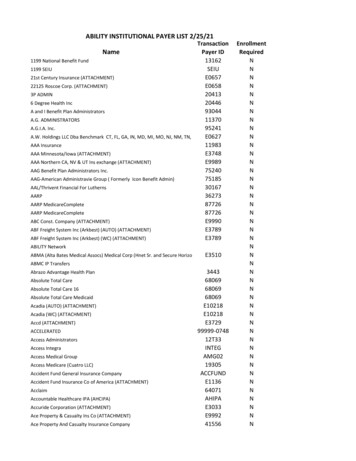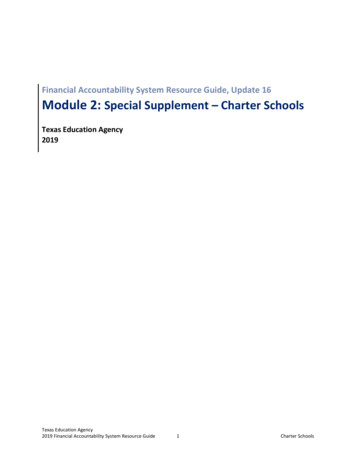
Transcription
Financial Accountability System Resource Guide, Update 16Module 2: Special Supplement – Charter SchoolsTexas Education Agency2019Texas Education Agency2019 Financial Accountability System Resource Guide1Charter Schools
Table of Contents2.1OVERVIEW.62.1.1Introduction . 62.1.2Applicability . 62.1.3Definitions . 72.2FINANCIAL ACCOUNTING AND REPORTING.92.2.1Authority. 92.2.1.1Generally Accepted Accounting Principles (GAAP). 92.2.1.2Texas Education Code. 92.2.1.3Texas Administrative Code . 92.2.2State Funds . 102.2.2.1Use of State Funds. 102.2.2.2Adjustments to Funds. 112.2.3Federal Funds. 132.2.4Account Code Structure . 132.2.5Financial Statement Elements . 142.2.5.1Cash and Investments. 142.2.5.2Capital Assets . 152.2.5.3Net Assets . 172.2.5.4Expenses. 182.2.6Cost Allocations . 182.2.6.1Cost Allocation Plan. 182.2.6.2Indirect Cost Rate Proposal . 192.2.72.2.7.1Special Accounting Treatments . 19Shared Service Arrangements. 19Texas Education Agency2019 Financial Accountability System Resource Guide2Charter Schools
2.2.7.22.2.8On-behalf Payments . 20Internal Control. 20. Data Submission Requirements. 212.2.9 . 212.2.9.1Annual Financial and Compliance Report . 222.2.9.2Charter School AFR Data Template. 232.2.9.3PEIMS . 232.2.9.4Single Audit and Data Collection Form (Form SF-SAC) . 232.3ANNUAL FINANCIAL AND COMPLIANCE REPORT (AFR) .252.3.1Auditor Requirements. 252.3.1.1Licensing. 252.3.1.2Retention of Working Papers. 252.3.1.3Access to Working Papers. 252.3.2Components of the AFR . 252.3.2.1Certificate of the Board . 272.3.2.2Independent Auditor’s Report. 272.3.2.3Statement of Financial Position . 282.3.2.4Statement of Activities . 282.3.2.5Statement of Cash Flows . 282.3.2.6Schedule of Expenses . 292.3.2.7Schedule of Capital Assets . 292.3.2.8Budgetary Comparison Schedule . 292.3.2.9Schedule of Findings and Questioned Costs. 292.3.2.10Schedule of Prior Audit Findings . 302.3.2.11Corrective Action Plan . 31Texas Education Agency2019 Financial Accountability System Resource Guide3Charter Schools
2.3.3Required Audit Disclosures . 312.3.3.1Training Requirements . 312.3.3.2Management Companies. 312.4COMPLIANCE .332.4.1Federal Compliance. 332.4.1.1Cash Management. 332.4.1.2Budget. 332.4.2State Compliance . 342.4.2.1Nepotism. 342.4.2.2Conflicts of Interest . 35. Depository Contract. 352.4.2.3. 35. Records Retention. 362.4.2.4. 362.4.2.5Uniform Grant Management Standards . 402.5BUDGETING .422.6PURCHASING .432.6.1Real Property Held in Trust . 432.6.2Competitive Procurement. 442.6.3Competitive Procurement Procedures on Certain Public Works Contracts. 442.6.4Professional Services. 452.6.5Conflict of Interest Statements . 462.7ACCOUNTABILITY.472.8OTHER REQUIREMENTS.49Texas Education Agency2019 Financial Accountability System Resource Guide4Charter Schools
2.8.1Non-Profit Status . 492.8.2State Compensatory Education . 49APPENDIX A: LIST OF ACRONYMS .50APPENDIX B: SAMPLE FINANCIAL AND COMPLIANCE REPORT .52APPENDIX C: USEFUL LINKS . ERROR! BOOKMARK NOT DEFINED.INDEX .92Texas Education Agency2019 Financial Accountability System Resource Guide5Charter Schools
2.1 Overview2.1.1 IntroductionModule 2: Charter Schools and Module 3: Charter Schools - Financial Accounting and Reporting Nonprofit Chart of Accounts are integral components of the Financial Accountability System ResourceGuide (FASRG).This module contains references to certain sections of the FASRG. Individuals responsible for theoversight and operation of an open-enrollment charter school must bear in mind that other sections ofthe FASRG may also apply to the operation of an open-enrollment charter school program. Also,although this module may identify certain requirements applicable to an open-enrollment charterschool, these same and other requirements may also apply to the charter holder, the governing bodyof the charter holder, and/or the governing body of the charter school. It should be noted, however,that certain requirements discussed in this module may not apply to the non-charter school programs,functions, services, and/or activities of the charter holder. Texas Education Code (TEC), §12.104discusses some specific requirements applicable to open-enrollment charter schools.2.1.2 ApplicabilityThe charter school modules discuss financial accounting and reporting requirements applicable toopen-enrollment charter schools operated by: a private or independent institution of higher education as defined under TEC, §61.003; oran organization that is exempt from taxation under Section 501(c)(3), Internal Revenue Code of1986 (26 U.S.C. Section 501(c)(3)).The financial accounting and reporting requirements discussed in the charter school modules do notapply to open- enrollment charter schools operated by: an institution of higher education as defined in TEC, §61.003; ora governmental entity.An open-enrollment charter school operated by an institution of higher education (that is not privateor independent) or a governmental entity must adhere to the financial accounting and reportingrequirements discussed in the other modules of the FASRG.Texas Education Agency2019 Financial Accountability System Resource Guide6Charter Schools
2.1.3 DefinitionsThis module will use the definitions below.1. “Charter school” means open-enrollment charter school as defined in TEC, Chapter 12.2. “Governing body of the charter school” means governing body of an open-enrollment charterschool as defined above.3. “Charter school official” means an officer of an open-enrollment charter school as definedabove.4. “Agent” means any individual or organization that is authorized by the charter holder pursuantto the authority vested in the office they hold or a contractual agreement to conduct businesson behalf of the charter holder. This includes, but is not necessarily limited to, the following: Members of the governing body of the charter holder and/or the charter school; Officials, representatives, and/or employees of the charter holder and/or the charterschool; and Independent third-party service providers acting on behalf of the charter holder and/orthe charter school.5. “Federal funds” means funds paid by the Texas Education Agency and received by the charterholder pursuant to a federal award granted to the charter holder.6. “Federal property” means any real or personal property purchased or leased with federal funds.7. “Public funds” means funds paid by the Texas Education Agency and received by the charterholder pursuant to TEC, §12.106.8. “Public property” means any real or personal property purchased or leased with public funds.9. “Real property” means real estate as defined in 19 Texas Administrative Code (TAC)§100.1001(4).10. “Personal property” means personal property as defined in 19 TAC §100.1001(6).The following definitions are in accordance with TEC, §12.1012:11. "Charter holder" means the entity to which a charter is granted under TEC, Chapter 12.12. "Governing body of a charter holder" means the board of directors, board of trustees, or othergoverning body of a charter holder.Texas Education Agency2019 Financial Accountability System Resource Guide7Charter Schools
13. "Governing body of an open-enrollment charter school" means the board of directors, board oftrustees, or other governing body of an open-enrollment charter school. The term includes thegoverning body of a charter holder if that body acts as the governing body of the openenrollment charter school.14. "Management company" means a person, other than a charter holder, who providesmanagement services for an open-enrollment charter school.15. "Management services" means services related to the management or operation of an openenrollment charter school, including:A. planning, operating, supervising, and evaluating the school's educational programs,services, and facilities;B. making recommendations to the governing body of the school relating to the selectionof school personnel;C. managing the school's day-to-day operations as its administrative manager;D. preparing and submitting to the governing body of the school a proposed budget;E. recommending policies to be adopted by the governing body of the school, developingappropriate procedures to implement policies adopted by the governing body of theschool, and overseeing the implementation of adopted policies; andF. providing leadership for the attainment of student performance at the school based onthe indicators adopted under TEC Sections 39.053 and 39.301 or by the governing bodyof the school.16. "Officer of an open-enrollment charter school" means:A. the principal, director, or other chief operating officer of an open-enrollment charterschool;B. an assistant principal or assistant director of an open-enrollment charter school; orC. a person charged with managing the finances of an open-enrollment charter school.Texas Education Agency2019 Financial Accountability System Resource Guide8Charter Schools
2.2 Financial Accounting and ReportingThe purpose of financial accounting and reporting by charter schools is to accumulate and provideinformation to facilitate decision making by various user groups. Certain requirements have beenestablished requiring charter schools to maintain proper financial accounting and reporting systems. Inaddition, principles and policies to ensure uniformity in accounting have been developed.2.2.1 Authority2.2.1.1 Generally Accepted Accounting Principles (GAAP)Guidelines for financial accounting and reporting are derived from generally accepted accountingprinciples (GAAP). Charter schools are required to adhere to GAAP. The Financial Accounting StandardsBoard (FASB) defines GAAP in the FASB Accounting Standards Codification TM (Codification) effective forfiscal years 2009/10 and later. FASB ASC 958 (Not-for-Profit Entities) contains information on GAAPspecific to non-profit entities. For additional information, see https://asc.fasb.org/.In the absence of specific guidance in this module, the charter holder is to follow GAAP.2.2.1.2 Texas Education CodeAn open-enrollment charter school is subject to state laws and rules governing public schools unlessotherwise stated (Texas Education Code (TEC, §12.1063)).TEC, §12.106 (c) allows the commissioner to adopt rules to provide and account for state funding ofopen-enrollment charter schools.As stated in TEC §12.1162, if the Texas Education Agency (TEA) conducts a special accreditationinvestigation and determines that an open-enrollment charter school fails to satisfy generally acceptedaccounting standards of fiscal management, the TEA may: Temporarily withhold fundingSuspend the authority of the charter school to operateTake other reasonable actions the commissioner determines necessaryTake any of the actions described by TEC, §39.102(a)2.2.1.3 Texas Administrative CodeTitle 19 of the Texas Administrative Code (TAC) §100.1047 provides rules for accounting for state andfederal funds for open-enrollment charter schools. A charter holder must comply fully with:Texas Education Agency2019 Financial Accountability System Resource Guide9Charter Schools
GAAPFinancial Accountability System Resource Guide, as adopted by 19 TAC §109.41Federal standards for financial management systems, 34 Code of Federal Regulations (CFR)§80.20, Office of Management and Budget (OMB)Circular A-87, and/or other applicable federalstandardsFinancial accountability rating system (Charter FIRST) specified in 19 TAC §109.1001A charter holder must keep separate and distinct accounting, auditing, budgeting, reporting, andrecordkeeping systems for the management and operation of the charter school.2.2.2 State FundsFunds received under TEC, §12.106 (state funding) after September 1, 2001, by a charter holder are heldin trust by the charter holder for the benefit of the students of the open-enrollment charter school andmay be used only for a purpose for which a school may use local funds under TEC, §45.105 (c). 1Charter schools must account for these state funds using net asset code 420 – Foundation SchoolProgram and other State Aid, which is used for all public funds received and state aid that is notreported under net asset codes 380-480. Refer to Module 3: Charter Schools - Financial Accounting andReporting Non-profit Chart of Accounts.2.2.2.1 Use of State FundsAs mandated in TEC, §12.107, state funds paid to the charter holder for the operation of the charterschool are to be used for the benefit of the students of the charter school and may only be used for thefollowing purposes authorized in TEC, §45.105 (c):1.2.3.4.5.purchasing appliances and supplies,paying insurance premiums,paying janitors and other employees,buying school sites,buying, building, repairing, and renting school buildings, including acquiring school buildings andsites by leasing through annual payments with an ultimate option to purchase, and for6. other purposes necessary in the conduct of the public schools determined by the board oftrustees.Special AllotmentsIn addition to the requirements noted above, state funds designated for a specific purpose must be usedfor purposes consistent with the applicable requirements of the program. Certain Foundation SchoolProgram (FSP) funds paid to the charter holder may represent special allotments for:1This provision was stated in TEC, §12.107, which was added by HB 6, 77th Legislative Session.Texas Education Agency2019 Financial Accountability System Resource Guide10Charter Schools
special educationcompensatory educationbilingual educationspecial languagecareer and technical educationgifted and talented educationSpecial Allotment Indirect Costs19 TAC §105.11 requires that no more than 48% of each school’s FSP special allotments may beexpended for indirect costs related to: compensatory educationbilingual educationspecial language programsspecial education19 TAC §105.11 also requires that: no more than 45% of each school’s FSP special allotments may be expended for indirect costsrelated to gifted and talented education programs no more than 42% of each school’s FSP special allotments may be expended for indirect costsrelated to career and technical education programsMaintenance of RecordsIt is the responsibility of the charter holder and the charter school to demonstrate that public fundswere used to secure goods and services for the benefit of the charter school’s students and that the useof public funds conformed to the requirements of TEC, §45.105(c), as outlined above. The charter holderand the charter school must maintain complete original records that clearly identify the businesspurpose of any disbursement of public funds and how these are aligned to the requirements discussedin this section and mandated by law.Social ActivitiesUnless directly related to the benefit of students, costs of entertainment, including amusement,diversion, and social activities and any costs directly associated with such costs (such as tickets to showsor sports events, meals, lodging, rentals, transportation, and gratuities) are unallowable. In addition todemonstrating that this type of expense resulted in a direct benefit to the students, the charter holderand/or the charter school must identify the students that benefited from the applicable disbursement ofpublic funds.2.2.2.2 Adjustments to FundsAs provided for in TEC, §12.106, the charter holder is entitled to receive state funds from theFoundation School Program (FSP) for the operation of its charter school(s). However, the FSP allocationTexas Education Agency2019 Financial Accountability System Resource Guide11Charter Schools
is subject to adjustment based on student data submitted by the charter school or as the result of anaudit or investigation of student attendance data.Audits19 TAC §100.1029 authorizes the TEA to conduct routine audits, monitoring, and other investigations ofthe charter school or charter holder to determine compliance with the terms of the open-enrollmentcharter, with the terms of federal or state grants, or as authorized in the Texas Education Code or otherlaw.Student Attendance AccountingCharter school attendance records may be audited by the TEA. TEA auditors have the authority toexamine attendance records for any year the charter school is required to retain records. An audit, asauthorized by 19 TAC §100.1029, is performed in accordance with Government Auditing Standards andincludes tests of the student attendance accounting procedures as considered necessary in thecircumstances. The objectives of an audit of a charter school’s attendance accounting system are todetermine the following: Compliance with rules regarding days of charter school operation and instructionCompliance with rules regarding student eligibilityCompliance with rules regarding student attendance for funding purposesCompliance with rules regarding student attendance accounting recordsCompleteness and accuracy of student attendance data reported to TEAAll attendance accounting systems must readily reproduce the student attendance data required in theStudent Attendance Accounting Handbook upon notification of an audit, regardless of the medium ofstorage used. Student attendance data must be organized into three distinct data sets: the StudentDetail Report, Campus Summary Report(s) and the District Summary Report. Each of these reports isdescribed in detail in the Student Attendance Accounting Handbook which the charter school shouldreview to ensure that all required documentation is present and available for audit. The retention periodfor all documentation required should be in accordance with the Texas State Library and ArchivesCommission Local Library Schedule S-D and G-R.Expansion AmendmentAccording to 19 TAC §100.1041(d), if a charter holder, before or without approval for an expansionamendment under 19 TAC §100.1033(d) (relating to Charter Amendment), extends the grade levels itserves, adds or changes the address of a campus, facility, or site, expands its geographic boundaries, orexceeds its maximum allowable enrollment, then the charter holder is not eligible to receive state fundsfor the activities of the unapproved amendment of its charter school operations (such as receive fundsor the attendance of students who are served on the campus that has engaged in an unapprovedexpansion of its charter school operations).Audit findings, comments, and recommendations by the TEA are intended to determine the proprietyof amounts funded in accordance with state law and to assist charter school officials in implementingbetter methods for determining and securing such future funding. In the event errors are detected,the TEA State Funding Division will adjust the charter school’s current fiscal year’s allocation uponreceiving the final audit report from the TEA division conducting the audit, unless the report isreceived during the final quarter of the current fiscal year. If the final audit report is received duringTexas Education Agency2019 Financial Accountability System Resource Guide12Charter Schools
the final quarter of a fiscal year, the audit adjustment will be applied against the charter school’sallocation for the subsequent fiscal year.In cases of extreme hardship, the audit adjustment may be spread across two years. Charter schoolsthat request extension of the audit adjustment will be required to demonstrate extreme hardship andwill be subject to continued financial monitoring throughout the repayment period. The maximumextension of an audit adjustment is the year in which the adjustment is first applied and thesubsequent fiscal year.2.2.3 Federal FundsFederal funds designated for a specific purpose must be used consistent with the project approved bythe grantor office and the applicable requirements of the grant or program. As stated in 19 TAC§100.1047, a charter holder that receives federal funds must comply fully with federal standards forfinancial management systems, 34 Code of Federal Regulations (CFR) §80.20, Office of Management andBudget (OMB) Circular A-87, and/or other applicable federal standards.2.2.4 Account Code StructureCharter schools must adopt a standard financial accounting system. The financial accounting systemmust meet at least the minimum requirements prescribed by th
Guidelines for financial accounting and reporting are derived from generally accepted accounting principles (GAAP). Charter schools are required to adhere to GAAP. The Financial Accounting Standards Board (FASB) defines GAAP in the FASB Accounting Standards Codification TM (Codification) effective for fiscal years 2009/10 and later.
